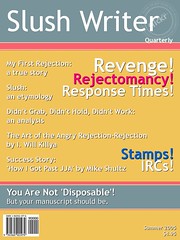Niall Harrison has some interesting thoughts on Things Critics Should Not Do:
[My review of Accelerando] was the first piece I wrote for [Interzone], and the first time I tried to compress a coherent judgment into 400 words. I mostly stand by the content, but I don’t think I got the construction of it quite right. I don’t think it’s a bad review, as such, but for instance … given the readership of Interzone and the limited space available, I probably spent more time than I needed to explaining what the book is and what it’s about. And then there’s the last sentence, in which I descended to blurbing.
Welcome to millennium three, decade one: science fiction isn’t the same any more.
I cringe every time I look at it, not so much because I don’t believe it–sure, it’s an overstatement, but whatever you want to say about the merits of Accelerando I think you have to recognise its importance–but because I know I wrote that sentence to look like something that might appear on the back of a book. And that’s the first thing I was saying … that Critics Should Not Do. The review doesn’t need it (and publishers should be made to work for their blurbs, dammit!)
He also references this Caitlin R. Kiernan quote (via Gwenda Bond & Chance):
There are many words and phrases that should be forever kept out of the hands of book reviewers. It’s sad, but true. And one of these is “self-indulgent.” Whoever reviewed Neil’s new novel, Anansi Boys, for Kirkus calls it “self-indulgent” (though the review is, generally, positive). And this is one of those things that strikes me very odd, like reviewers accusing an author of writing in a way that seems “artificial” or “self-conscious.” It is, of course, a necessary prerequisite of fiction that one employ the artifice of language and that one exist in an intensely self-conscious state. Same with “self-indulgent.” What could possibly be more self-indulgent than the act of writing fantastic fiction? The author is indulging her- or himself in the expression of the fantasy, and, likewise, the readers are indulging themselves in the luxury of someone else’s fantasy. I’ve never written a story that wasn’t self-indulgent. Neither has any other fantasy or sf author. We indulge our interests, our obsessions, and assume that someone out there will feel as passionately about X as we do.
I blogged the above because I thought it was interesting and wanted to share, but while I’m at it, I just wanted to point out that the reviewer in question wasn’t me. I do review for Kirkus, but I would never call Neil “self-indulgent.” (Well, I shouldn’t say never, but I kind of doubt I would.) I haven’t read the book yet, but I do hope to review the audiobook for Publishers Weekly.
I was also not the Kirkus reviewer who reviewed Scott Westerfeld‘s Peeps, as was speculated on his blog. I did, however, write a review of it, and I hope Niall will like it, despite my rather blurby last sentence.
Read More




